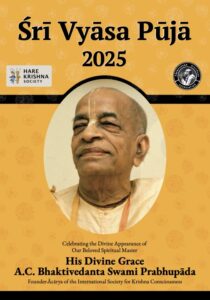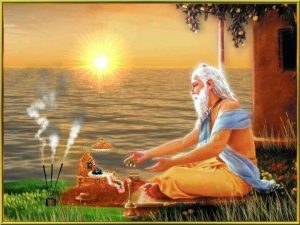BG 4.9-“One who knows the transcendental nature of My appearance and activities does not, upon leaving the body, take his birth again in this material world, but attains My eternal abode, O Arjuna.”
This very important verse above from BG is further explained by the below verses from SB where it is shown how God is impartial, neutral and has neither friend nor foe. To know this for a fact and how it works in the material world is necessary BEFORE we go back to Godhead.
SB 7.1.23 purport...The conditioned soul, being seated on this machine, wanders throughout the universe, and because of his bodily conception of life he only suffers. Actually the suffering of being blasphemed and the enjoyment of being praised, the acceptance of a good welcome or of chastisement by harsh words, are felt in the material conception of life; but since the body of the Supreme Personality of Godhead is not material but sac-cid-ānanda-vigraha [Bs. 5.1], He is unaffected by insults or greetings, blasphemy or prayers. Being always unaffected and complete, He does not feel extra pleasure when offered nice prayers by the devotee, although the devotee benefits by offering prayers to the Lord. Indeed, the Lord is very kind to His so-called enemy because one who always thinks of the Personality of Godhead as an enemy also benefits, although he thinks of the Lord adversely. If a conditioned soul, thinking of the Lord as an enemy or a friend, somehow or other becomes attached to the Lord, he receives great benefit.
SB 7.1.25-My dear King, the conditioned soul, being in the bodily conception of life, considers his body to be his self and considers everything in relationship with the body to be his. Because he has this wrong conception of life, he is subjected to dualities like praise and chastisement.
PURPORT-Only when a conditioned soul accepts the body as himself does he feel the effects of chastisement or praise. Then he determines one person to be his enemy and another his friend and wants to chastise the enemy and welcome the friend. This creation of friends and enemies is a result of one’s bodily conception of life.
SB 7.1.25-Because of the bodily conception of life, the conditioned soul thinks that when the body is annihilated the living being is annihilated. Lord Viṣṇu, the Supreme Personality of Godhead, is the supreme controller, the Supersoul of all living entities. Because He has no material body, He has no false conception of “I and mine.” It is therefore incorrect to think that He feels pleasure or pain when blasphemed or offered prayers. This is impossible for Him. Thus He has no enemy and no friend. When He chastises the demons it is for their good, and when He accepts the prayers of the devotees it is for their good. He is affected neither by prayers nor by blasphemy.
PURPORT-Because of being covered by material bodies, the conditioned souls, including even greatly learned scholars and falsely educated professors, all think that as soon as the body is finished, everything is finished. This is due to their bodily conception of life. Kṛṣṇa has no such bodily conception, nor is His body different from His self. Therefore, since Kṛṣṇa has no material conception of life, how can He be affected by material prayers and accusations? Kṛṣṇa’s body is described herewith as kaivalya, nondifferent from Himself. Since everyone has a material bodily conception of life, if Kṛṣṇa had such a conception what would be the difference between Kṛṣṇa and the conditioned soul? Kṛṣṇa’s instructions in Bhagavad-gītā are accepted as final because He does not possess a material body. As soon as one has a material body he has four deficiencies, but since Kṛṣṇa does not possess a material body, He has no deficiencies. He is always spiritually conscious and blissful. Īśvaraḥ paramaḥ kṛṣṇaḥ sac-cid-ānanda-vigrahaḥ [Bs. 5.1]: His form is eternal, blissful knowledge. Sac-cid-ānanda-vigrahaḥ, ānanda-cinmaya-rasa and kaivalya are the same.
Kṛṣṇa can expand Himself as Paramātmā in the core of everyone’s heart….Although situated in everyone’s body, He has no bodily conception of life. He is always free from such conceptions, and thus He cannot be affected by anything in relation to the material body of the jīva.
… The conditioned soul, being envious of the Supreme Personality of Godhead, may accuse Him, saying, “Kṛṣṇa is bad, Kṛṣṇa is a thief” and so on, but Kṛṣṇa, being kind to all living entities, does not consider such accusations. Instead, He takes account of the conditioned soul’s chanting of “Kṛṣṇa, Kṛṣṇa” so many times. He sometimes punishes such demons for one life by putting them in a lower species, but then, when they have stopped accusing Him, they are liberated in the next life because of chanting Kṛṣṇa’s name constantly. Blaspheming the Supreme Lord or His devotee is not at all good for the conditioned soul, but Kṛṣṇa, being very kind, punishes the conditioned soul in one life for such sinful activities and then takes him back home, back to Godhead. The vivid example for this is Vṛtrāsura, who was formerly Citraketu Mahārāja, a great devotee. Because he derided Lord Śiva, the foremost of all devotees, he had to accept the body of a demon called Vṛtra, but then he was taken back to Godhead. Thus when Kṛṣṇa punishes a demon or conditioned soul, He stops that soul’s habit of blaspheming Him, and when the soul becomes completely pure, the Lord takes him back to Godhead.
SB 7.1.26-Therefore by enmity or by devotional service, by fear, by affection or by lusty desire—by all of these or any one of them—if a conditioned soul somehow or other concentrates his mind upon the Lord, the result is the same, for the Lord, because of His blissful position, is never affected by enmity or friendship.
PURPORT-From this verse one should not conclude that because Kṛṣṇa is unaffected by favorable prayers or unfavorable blasphemy one should therefore blaspheme the Supreme Lord. This is not the regulative principle. …
One who hears blasphemy of the Supreme Personality of Godhead or His devotees should immediately take action or should leave. Otherwise he will be put into hellish life perpetually. There are many such injunctions. Therefore as a regulative principle one should not be unfavorable toward the Lord but always favorably inclined toward Him.
Śiśupāla’s achievement of oneness with the Supreme Lord was different because Jaya and Vijaya, from the very beginning of their material existence, were ordained to treat the Supreme Lord as an enemy for three lives and then return home, back to Godhead. Jaya and Vijaya inwardly knew that Kṛṣṇa is the Supreme Personality of Godhead, but they purposely became His enemies to be delivered from material life. From the very beginning of their lives they thought of Lord Kṛṣṇa as an enemy, and even though blaspheming Lord Kṛṣṇa, they chanted the holy name of Kṛṣṇa constantly along with their inimical thoughts. Thus they were purified because of chanting the holy name of Kṛṣṇa. It is to be understood that even a blasphemer can be freed from sinful activities by chanting the holy name of the Lord. Certainly, therefore, freedom is assured for a devotee who is always favorable to the service of the Lord. …
Śrīla Viśvanātha Cakravartī Ṭhākura has very nicely explained the word bhayena, which means “by fear.” When the gopīs went to Kṛṣṇa in the dead of night, they certainly feared chastisement by their relatives—their husbands, brothers and fathers—but nonetheless, not caring for their relatives, they went to Kṛṣṇa. There was certainly fear, but this fear could not check their devotional service to Kṛṣṇa.
One should not mistakenly think that Lord Kṛṣṇa must be worshiped by an inimical attitude like that of Śiśupāla. The injunction is ānukūlyasya grahaṇaṁ prātikūlyasya varjanam: one should give up unfavorable activities and accept only favorable conditions in devotional service. Generally, if one blasphemes the Supreme Personality of Godhead he is punished. As the Lord says in Bhagavad-gītā (16.19):
tān ahaṁ dviṣataḥ krūrān
saṁsāreṣu narādhamān
kṣipāmy ajasram aśubhān
āsurīṣv eva yoniṣu
There are many such injunctions. One should not try to worship Kṛṣṇa unfavorably; otherwise he must be punished, at least for one life, to be purified. As one should not try to be killed by embracing an enemy, a tiger or a snake, one should not blaspheme the Supreme Personality of Godhead and become His enemy in order to be put into hellish life.
The purpose of this verse is to emphasize that even the enemy of the Lord can be delivered, not to speak of His friend. Śrīla Madhvācārya also says in many ways that one should not blaspheme Lord Viṣṇu through one’s mind, words or actions, for a blasphemer will go to hellish life along with his forefathers.
SB 7.1.27-Nārada Muni continued: By devotional service one cannot achieve such intense absorption in thought of the Supreme Personality of Godhead as one can through enmity toward Him. That is my opinion.
PURPORT-Śrīmān Nārada Muni, the topmost pure devotee, praises Kṛṣṇa’s enemies like Śiśupāla because their minds are always completely absorbed in Kṛṣṇa. Indeed, he thinks himself deficient in the inspiration of being feelingly absorbed in Kṛṣṇa consciousness. This does not mean, however, that the enemies of Kṛṣṇa are more elevated than Kṛṣṇa’s pure devotees. In the Caitanya-caritāmṛta (Ādi 5.205) Kṛṣṇadāsa Kavirāja Gosvāmī also thinks of himself in such a humble way:“I am a worse sinner than Jagāi and Mādhāi and am even lower than the worms in the stool.” A pure devotee always thinks himself more deficient than everyone else. If a devotee approaches Śrīmatī Rādhārāṇī to offer some service to Kṛṣṇa, even Śrīmatī Rādhārāṇī thinks that the devotee is greater than She. Thus Nārada Muni says that according to his opinion the enemies of Kṛṣṇa are better situated because they are fully absorbed in thoughts of Kṛṣṇa in terms of killing Him, just as a very lusty man always thinks of women and their association
Some Conclusions–statements by Prabhupada like this…., He does not feel extra pleasure when offered nice prayers by the devotees… or this one..”Kṛṣṇa’s instructions in Bhagavad-gītā are accepted as final because He does not possess a material body”, or this one….”He is unaffected by insults or greetings, blasphemy or prayers.” or this one….Kṛṣṇa is bad, Kṛṣṇa is a thief” and so on, but Kṛṣṇa, being kind to all living entities, does not consider such accusations. Instead, He takes account of the conditioned soul’s chanting of “Kṛṣṇa, Kṛṣṇa” so many times”.
All these taken together and those from my previous article from this same 7th canto chapter one-show how The Supreme Lord is equal to all and friend to no one. But to His devotees, who want to get to know Him, those persons He takes special interest because they have awakened a special interest in Him thru the process of hearing.-the first of 9 process of authorized bhakti or devotion for the Lord.. All this is done by the process of sadhana bhakti which cleanes the mirror of the mind thru chanting Hare Krsna maha mantra.




